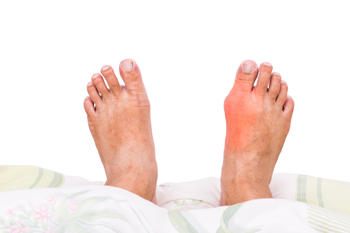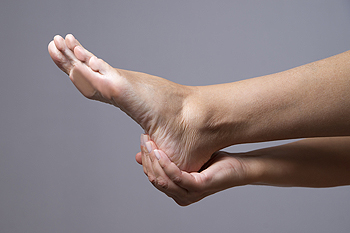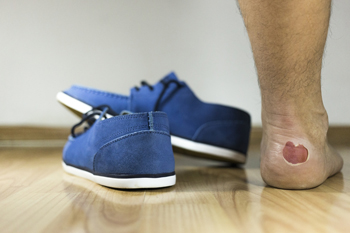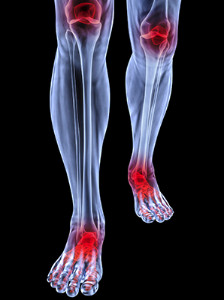Connect With Us
Blog
Intense Pain May Accompany Gout
 An excess of uric acid levels in the blood may lead to a painful condition known as gout. When the body has difficulty in processing this buildup, crystals will typically form in the joint of the big toe. It is often considered to be a form of arthritis, and may cause considerable pain and discomfort. This ailment may develop as a result of ingesting foods that are rich in purines, which may often include red wine, seafood or chocolate. Research has shown there may be several predispositions for gout to occur. People who have high blood pressure or who have abnormal kidney functions may be at a greater risk to develop this ailment. Patients who are afflicted with gout are aware of the intense pain, swelling and redness that accompanies this predicament. If you have developed gout it's suggested to consult with a podiatrist who can provide valuable information about the treatment of this debilitating condition.
An excess of uric acid levels in the blood may lead to a painful condition known as gout. When the body has difficulty in processing this buildup, crystals will typically form in the joint of the big toe. It is often considered to be a form of arthritis, and may cause considerable pain and discomfort. This ailment may develop as a result of ingesting foods that are rich in purines, which may often include red wine, seafood or chocolate. Research has shown there may be several predispositions for gout to occur. People who have high blood pressure or who have abnormal kidney functions may be at a greater risk to develop this ailment. Patients who are afflicted with gout are aware of the intense pain, swelling and redness that accompanies this predicament. If you have developed gout it's suggested to consult with a podiatrist who can provide valuable information about the treatment of this debilitating condition.
Gout is a painful condition that can be treated. If you are seeking treatment, contact one of our podiatrists from Foot & Ankle Associates of Maine. Our doctors will treat your foot and ankle needs.
What Is Gout?
Gout is a form of arthritis that is characterized by sudden, severe attacks of pain, redness, and tenderness in the joints. The condition usually affects the joint at the base of the big toe. A gout attack can occur at any random time, such as the middle of the night while you are asleep.
Symptoms
- Intense Joint Pain - Usually around the large joint of your big toe, and it most severe within the first four to twelve hours
- Lingering Discomfort - Joint discomfort may last from a few days to a few weeks
- Inflammation and Redness -Affected joints may become swollen, tender, warm and red
- Limited Range of Motion - May experience a decrease in joint mobility
Risk Factors
- Genetics - If family members have gout, you’re more likely to have it
- Medications - Diuretic medications can raise uric acid levels
- Gender/Age - Gout is more common in men until the age of 60. It is believed that estrogen protects women until that point
- Diet - Eating red meat and shellfish increases your risk
- Alcohol - Having more than two alcoholic drinks per day increases your risk
- Obesity - Obese people are at a higher risk for gout
Prior to visiting your podiatrist to receive treatment for gout, there are a few things you should do beforehand. If you have gout you should write down your symptoms--including when they started and how often you experience them, important medical information you may have, and any questions you may have. Writing down these three things will help your podiatrist in assessing your specific situation so that he or she may provide the best route of treatment for you.
If you have any questions, please feel free to contact our office located in Brunswick, ME . We offer the newest diagnostic and treatment technologies for all your foot care needs.
Are Plantar Warts Painful?
 The majority of warts can be unsightly and painful, and a plantar wart is no exception. This type of wart develops on the heel of the foot and will grow inward as a result of the pressure the feet endures on a daily basis. It is known to be caused by the human papillomavirus, which is also referred to as HPV, and may be more prevalent in children and people who have compromised immune systems. This contagious virus can be transmitted by direct contact with a person who may carry the germ or from an object that may have been contaminated. Some of the symptoms that might be associated with plantar warts may include a small area that may be rough in texture on the heel of the foot. Additionally, there may be tiny black dots in the center of the wart, and you may experience pain while walking or standing. If you are afflicted with plantar warts, it’s suggested to speak with a podiatrist who can offer correct treatment options that may include removal of the wart.
The majority of warts can be unsightly and painful, and a plantar wart is no exception. This type of wart develops on the heel of the foot and will grow inward as a result of the pressure the feet endures on a daily basis. It is known to be caused by the human papillomavirus, which is also referred to as HPV, and may be more prevalent in children and people who have compromised immune systems. This contagious virus can be transmitted by direct contact with a person who may carry the germ or from an object that may have been contaminated. Some of the symptoms that might be associated with plantar warts may include a small area that may be rough in texture on the heel of the foot. Additionally, there may be tiny black dots in the center of the wart, and you may experience pain while walking or standing. If you are afflicted with plantar warts, it’s suggested to speak with a podiatrist who can offer correct treatment options that may include removal of the wart.
Plantar warts can be very uncomfortable. If you need your feet checked, contact one of our podiatrists from Foot & Ankle Associates of Maine. Our doctors will assist you with all of your foot and ankle needs.
About Plantar Warts
Plantar warts are the result of HPV, or human papillomavirus, getting into open wounds on the feet. They are mostly found on the heels or balls of the feet.
While plantar warts are generally harmless, those experiencing excessive pain or those suffering from diabetes or a compromised immune system require immediate medical care. Plantar warts are easily diagnosed, usually through scraping off a bit of rough skin or by getting a biopsy.
Symptoms
- Lesions on the bottom of your feet, usually rough and grainy
- Hard or thick callused spots
- Wart seeds, which are small clotted blood vessels that look like little black spots
- Pain, discomfort, or tenderness of your feet when walking or standing
Treatment
- Freezing
- Electric tool removal
- Laser Treatment
- Topical Creams (prescription only)
- Over-the-counter medications
To help prevent developing plantar warts, avoid walking barefoot over abrasive surfaces that can cause cuts or wounds for HPV to get into. Avoiding direct contact with other warts, as well as not picking or rubbing existing warts, can help prevent the further spread of plantar warts. However, if you think you have developed plantar warts, speak to your podiatrist. He or she can diagnose the warts on your feet and recommend the appropriate treatment options.
If you have any questions please feel free to contact our office located in Brunswick, ME . We offer the newest diagnostic and treatment technologies for all your foot and ankle needs.
Common Reasons for Blisters to Form
 Many people are aware of the discomfort that is typically associated with blisters on the feet. A blister affects the skin on the feet, and the body’s natural response to injured skin will often result in forming a bubble of fluid over the affected area. This will protect the skin from additional damage or infection that may occur. The most common reason for blisters to develop may be wearing shoes that do not fit properly and this may cause friction as the shoes rub against the skin. Additionally, blisters may develop if you are exposed to extremely cold temperatures, which may cause frostbite to occur. Blisters may also form as a result of a harsh sunburn, or an allergic reaction to an insect bite. Treatment may generally include using a gauze covering for protection, while wearing shoes, followed by fresh air exposure when the shoes are removed, which may accelerate the healing process. It is suggested to seek the counsel of a podiatrist to learn about additional treatment options for blisters.
Many people are aware of the discomfort that is typically associated with blisters on the feet. A blister affects the skin on the feet, and the body’s natural response to injured skin will often result in forming a bubble of fluid over the affected area. This will protect the skin from additional damage or infection that may occur. The most common reason for blisters to develop may be wearing shoes that do not fit properly and this may cause friction as the shoes rub against the skin. Additionally, blisters may develop if you are exposed to extremely cold temperatures, which may cause frostbite to occur. Blisters may also form as a result of a harsh sunburn, or an allergic reaction to an insect bite. Treatment may generally include using a gauze covering for protection, while wearing shoes, followed by fresh air exposure when the shoes are removed, which may accelerate the healing process. It is suggested to seek the counsel of a podiatrist to learn about additional treatment options for blisters.
Blisters may appear as a single bubble or in a cluster. They can cause a lot of pain and may be filled with pus, blood, or watery serum. If your feet are hurting, contact one of our podiatrists of Foot & Ankle Associates of Maine. Our doctors can provide the care you need to keep you pain-free and on your feet.
Foot Blisters
Foot blisters are often the result of friction. This happens due to the constant rubbing from shoes, which can lead to pain.
What Are Foot Blisters?
A foot blister is a small fluid-filled pocket that forms on the upper-most layer of the skin. Blisters are filled with clear fluid and can lead to blood drainage or pus if the area becomes infected.
Symptoms
(Blister symptoms may vary depending on what is causing them)
- Bubble of skin filled with fluid
- Redness
- Moderate to severe pain
- Itching
Prevention & Treatment
In order to prevent blisters, you should be sure to wear comfortable shoes with socks that cushion your feet and absorb sweat. Breaking a blister open may increase your chances of developing an infection. However, if your blister breaks, you should wash the area with soap and water immediately and then apply a bandage to the affected area. If your blisters cause severe pain it is important that you call your podiatrist right away.
If you have any questions, please feel free to contact our office located in Brunswick, ME . We offer the newest diagnostic and treatment technologies for all your foot care needs.
The Development of Rheumatoid Arthritis in the Feet
 The condition known as rheumatoid arthritis is a painful ailment that typically affects the muscles and joints. When this occurs in the feet, the toenails may become affected in addition to the patient possibly experiencing pain and stiffness. The discomfort is generally felt in the smaller joints in the feet, and this can possibly lead to the formation of corns and bunions. In severe cases, the toes may curl and hammertoe may develop as a result of this. This particular form of arthritis occurs when the body’s immune system is compromised. The ability to fight infection is diminished, and this may cause pain and swelling to gradually develop. If you are afflicted with rheumatoid arthritis in the joints of the feet, it’s strongly suggested that you consult with a podiatrist, so correct treatment can commence.
The condition known as rheumatoid arthritis is a painful ailment that typically affects the muscles and joints. When this occurs in the feet, the toenails may become affected in addition to the patient possibly experiencing pain and stiffness. The discomfort is generally felt in the smaller joints in the feet, and this can possibly lead to the formation of corns and bunions. In severe cases, the toes may curl and hammertoe may develop as a result of this. This particular form of arthritis occurs when the body’s immune system is compromised. The ability to fight infection is diminished, and this may cause pain and swelling to gradually develop. If you are afflicted with rheumatoid arthritis in the joints of the feet, it’s strongly suggested that you consult with a podiatrist, so correct treatment can commence.
Because RA affects more than just your joints, including the joints in your feet and ankles, it is important to seek early diagnosis from your podiatrist if you feel like the pain in your feet might be caused by RA. For more information, contact one of our podiatrists of Foot & Ankle Associates of Maine. Our doctors will assist you with all of your podiatric concerns.
What Is Rheumatoid Arthritis?
Rheumatoid Arthritis (RA) is an autoimmune disorder in which the body’s own immune system attacks the membranes surrounding the joints. Inflammation of the lining and eventually the destruction of the joint’s cartilage and bone occur, causing severe pain and immobility.
Rheumatoid Arthritis of the Feet
Although RA usually attacks multiple bones and joints throughout the entire body, almost 90 percent of cases result in pain in the foot or ankle area.
Symptoms
- Swelling and pain in the feet
- Stiffness in the feet
- Pain on the ball or sole of feet
- Joint shift and deformation
Diagnosis
Quick diagnosis of RA in the feet is important so that the podiatrist can treat the area effectively. Your doctor will ask you about your medical history, occupation, and lifestyle to determine the origin of the condition. Rheumatoid Factor tests help to determine if someone is affected by the disease.
If you have any questions please feel free to contact our office located in Brunswick, ME . We offer the newest diagnostic and treatment technologies for all your foot and ankle needs.
